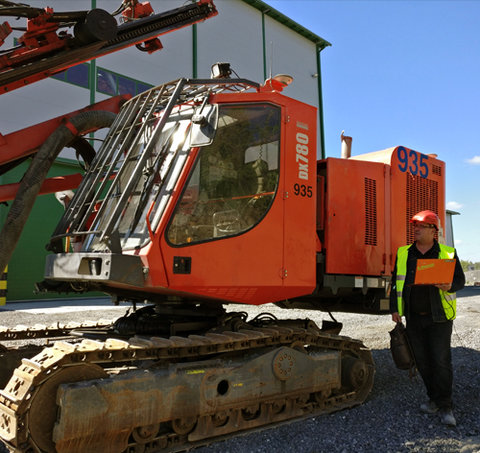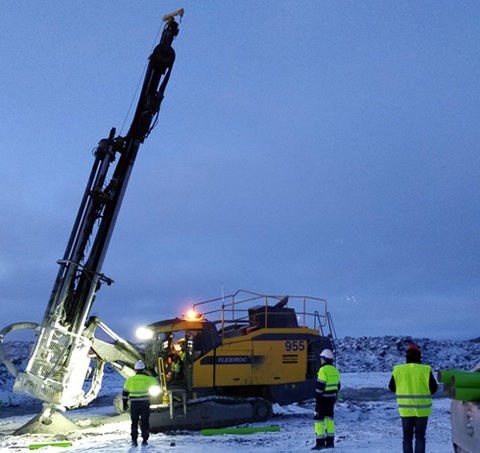Connecting people
Machines and Places.
Fast track to mining digitalization.
Agile solutions for intelligent mining.
Products and Services

Boost your daily operations with our agile solutions for heavy industry IoT.
Millisecond is specialized in providing hardware and software solutions that can be used in a variety of industries such as mining, harbours, logistics, and Intelligent Traffic Systems /Smart Traffic.
CAN#VAS product family.
CAN#VAS is a portfolio of hardware and software components for processing operational data about vehicles and equipment. Trucks, drills, scoops and other industrial machinery can be monitored vendor- independently. Optimizing the use of your assets and operations can bring massive efficiency improvements. What's more: Getting data from multi-brand machinery does not require several separate solutions nor heavy investment.
From sensor to decision.
Millisecond data integration platform collects and combines the data from different IoT sensors and devices supplied by various vendors. The data is processed and visualized onto role-based dashboards, providing visibility into the process cycles and notifying about relevant incidents and events. The platform is built on latest cloud technologies and is typically offered as a Solution as a Service (SaaS). The approach ensures a quick ramp-up to production with an affordable upfront investment.
Data cloud services.
We are specialized in software development and integration services in the areas of big data, analytics, industrial IoT and consumer data. Millisecond team has huge experience in building digital business solutions with latest tools and technologies.

CAN#VAS (Vehicle Analytics Suite) in a nutshell:
CAN#VAS Flow device plugs into the vehicle's CAN bus. CAN#VAS Kolibrio device plugs into any USB. CAN#VAS communicates with Millisecond cloud infrastructure. Big data processors crunch the raw data, which is then visualized in personalized reports and dashboards.

Covering the cycle phases.
Open data from OEM manufacturers enable CAN#VAS products to hook into different phases of the mining process. Millisecond data integration platform connects the dots.
Millisecond has created a multivendor, easy to implement real-time analytics suite to support data driven and fact based decision making.
Millisecond universal data collectors collect real-time data from drills, trucks and surrounding systems of any brand.
The relevant data is visualized on dashboard and transferred to customers production management system.
CAN#VAS Kolibri/o for wireless drilling data automation.

Automated transfer of drilling data wirelessly for drills of any brand:
- Send drilling plans to drills over the air
- Transfer actual drilling data back automatically
- Drilling plans can be updated based on actual drilling data in real-time
- Enrich data with 3rd party data
- Quick to implement
- Can be plugged into any drill, e.g. Atlas Copco, Sandvik
Low investment - Easy to install – Immediate benefits:
- No manual uploads and downloads of files via USB memory sticks
- Get accurate drilling data from the field in real-time
- Enables a more optimized charging and blasting process
- Efficient and high-quality drilling
- Simplified drilling process & increased safety

CAN#VAS Flow - real-time visibility and operations control.

Multi-brand data collection for vehicles and other mining equipment:
- For open pits and underground mines
- Installation directly to vehicle’s existing connectors
- Send CAN data, location and other measures from any brand and type
- Utilize existing network connectivity infrastructure
- Data-ferries secure data availability also from non-networked tunnels
Low investment – Immediate benefits:
- Online KPI dashboards available for operational and service personnel
- Last known locations of mobile and other assets increase efficiency and safety
- Visibility to accurate cycle times, utilization and unplanned breaks increase planning accuracy
- Machine-health monitoring
Optimization decisions of mine operations require accurate information about current performance. Typically there are still areas where detailed facts are missing. We listen to the customer needs, fill the gaps and ensure visibility to the relevant information and to the relevant personnel – as real-time as possible.
Turning the lights on.
Not sure what is going on in your underground mines? Curious or worried about the efficiency of your fleet and equipment investment? CAN#VAS for Mining is your one-stop-solution to turn the lights on under the ground and to deliver the relevant reports and signals to steer the operations.
case studies.

Millisecond Kolibrio solution in action @ Yara Finland
Case Yara Finland: CAN#VAS Kolibrio - 4 months from idea to production.
Agile fit-for-purpose solution creation.
Yara Finland presented Millisecond team with a typical challenge in mining - and was positively surprised: “We were happy to see that with the help of an innovative team it was possible to get concrete solutions to our specific problem very quickly and efficiently without having to invest in a massive project that cost millions”, explains Sakari Mononen, Mine Manager at Yara Siilinjärvi mine.
Millisecond´s Matti Volotinen says: “We were offered the opportunity to look into something that had been bothering Yara for quite a while, and to come up with a solution. The task given was to replace the current manual transfer of the drill data via USB sticks with an automated wireless transfer solution. We were told that if we would be able to create a solution for both of the drill rigs in use: Sandvik and Atlas Copco, it would remarkably simplify the existing procedures, improve quality and boost efficiency in the daily operations.
Within a few weeks a development project kick-off meeting with relevant specialists from both teams to make a thorough assessment of the task at hand was arranged. Millisecond jumped right in and started scoping alternative solutions. A Proof of Concept was finalized in just over two months, after which a few testing sessions were executed. The pilot and delivery agreement was signed, and the system was up and running only four months after the first meeting. The end result of the project was a working solution for the customer’s problem: A new product called CAN#VAS Kolibri/o. Today several additional mines benefit from the solution.
The Millisecond formula.
“A key element in our philosophy is to approach our mining customers in a “down-to-earth way”, says Matti Volotinen. “We are not mining specialists so our aim is to truly listen to our customers’ needs to understand their daily operational requirements and key challenges. Our goal is to pinpoint the processes that create problems or (operational) inefficiencies and come up with agile and innovative solutions with the help of modern technology and digitalization. These solutions do not have to be overly complex or expensive. Transparency in collaboration results in products that are truly fit-for-purpose and meet customer requirements to the point.”
According to Yara's Sakari Mononen, the project went surprisingly smoothly. “Millisecond worked in a humble manner and really listened to us, collaborating seamlessly with both us and with our mining operator E. Hartikainen Oy. The on-site testing of the Millisecond’s solution in cooperation with us was a key element of the process and really highlighted the vendor’s professionalism” Sakari continues. “I’m really pleased with how Millisecond handled it. This way customers are directly involved in product development and can make sure that it will really meet the needs. We hope to have the opportunity to work with Millisecond also in the future”, Sakari concludes.
CAN#VAS enables visibility to your operations in both open pit and underground mines.
visit us.
EXPOMIN 2018
April 23-27th, 2018
Santiago, Chile

You will find us at the Mining Finland Stand.
THE REGION’S MOST FORWARD THINKING MINING TECH SHOW
29 -31 May, 2018
Scandic Marina Congress Center, Helsinki, Finland.

You will find us at the Mining Finland Stand.

